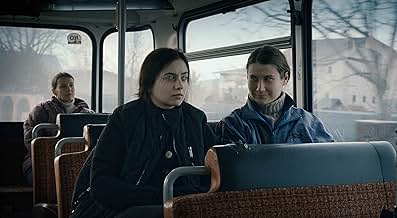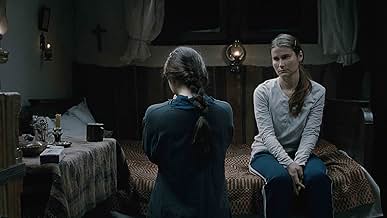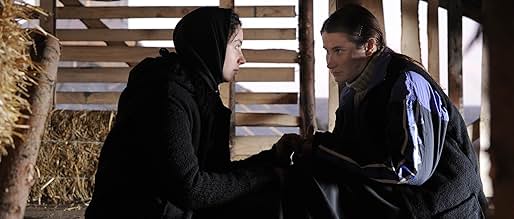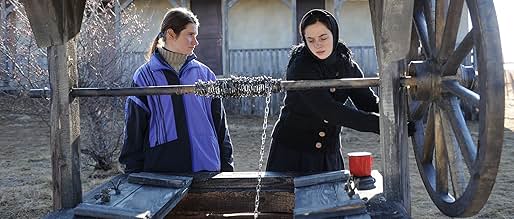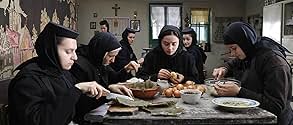NOTE IMDb
7,5/10
14 k
MA NOTE
L'amitié entre deux jeunes femmes qui ont grandi dans le même orphelinat. L'une trouve refuge dans un couvent en Roumanie et refuse de partir chez son amie, qui vit maintenant en Allemagne.L'amitié entre deux jeunes femmes qui ont grandi dans le même orphelinat. L'une trouve refuge dans un couvent en Roumanie et refuse de partir chez son amie, qui vit maintenant en Allemagne.L'amitié entre deux jeunes femmes qui ont grandi dans le même orphelinat. L'une trouve refuge dans un couvent en Roumanie et refuse de partir chez son amie, qui vit maintenant en Allemagne.
- Réalisation
- Scénario
- Casting principal
- Récompenses
- 8 victoires et 19 nominations au total
Valeriu Andriuta
- Priest
- (as Valeriu Andriutã)
Avis à la une
A KVIFF viewing of Romanian auteur Cristian Mugiu's latest gripping modern exorcism tale which has garnered two wins in Cannes this year, a BEST SCREENPLAY award and the young pair Cosmina Stratan and Cristina Flutur shared Best Actress honor, which staunchly vindicates Cristian's consistent excellence not only in his fine-tempo and well-pitched directing bent, but a robust script and ultra-overpowering cast as a whole superlative pack.
Like his breakthrough chef-d'oeuvre 4 MONTHS, 3 WEEKS AND 2 DAYS (2009, a 9/10), the film anew grapples with the contentious subject-matters (this time it is about religious belief) and assigns two young girls in the main roles. The film acquaints its viewers with a secluded locale, an austere monastery (with no electricity and utilizing well water for example) is in stark contrast to the contemporary modernity, then slowly unwinds a tug-of-war in the name of love between God and human, a hapless destiny falls upon 2 girls from the same orphanage, one has become a pious nun so far, yet another is an obstinate non-believer, who chooses God as her love competitor and defies any compromise.
There is an unremitting impulse of captivation throughout the entire film which successfully banishes the awareness of its 150-minutes length. One of Mungiu's trump card is his virtuoso camera deployment, which has again fixated on a well-organized angle, especially in the indoor scenes, all the inconsequential items have been placed into incessant expositions of still paintings.
A strong-arm tension has been outstandingly established among three main characters (the said two girls plus the priest), although a few well-worn plot twists-and-turns may not survive the hindsight, however the eventual repercussion is nothing if not astonishing.
Much accolades should be granted to the film about its no shade of grey amplification of managing the thorny issue, the clear-minded of eschewing any grandiosity with a telling coda, which can never be less appreciated among cinephiles.
Like his breakthrough chef-d'oeuvre 4 MONTHS, 3 WEEKS AND 2 DAYS (2009, a 9/10), the film anew grapples with the contentious subject-matters (this time it is about religious belief) and assigns two young girls in the main roles. The film acquaints its viewers with a secluded locale, an austere monastery (with no electricity and utilizing well water for example) is in stark contrast to the contemporary modernity, then slowly unwinds a tug-of-war in the name of love between God and human, a hapless destiny falls upon 2 girls from the same orphanage, one has become a pious nun so far, yet another is an obstinate non-believer, who chooses God as her love competitor and defies any compromise.
There is an unremitting impulse of captivation throughout the entire film which successfully banishes the awareness of its 150-minutes length. One of Mungiu's trump card is his virtuoso camera deployment, which has again fixated on a well-organized angle, especially in the indoor scenes, all the inconsequential items have been placed into incessant expositions of still paintings.
A strong-arm tension has been outstandingly established among three main characters (the said two girls plus the priest), although a few well-worn plot twists-and-turns may not survive the hindsight, however the eventual repercussion is nothing if not astonishing.
Much accolades should be granted to the film about its no shade of grey amplification of managing the thorny issue, the clear-minded of eschewing any grandiosity with a telling coda, which can never be less appreciated among cinephiles.
'Based on a true story' – a phrase that can cover so many bases - is the slow-burning and languorous Romanian film Beyond the Hills.
Set predominantly in a monastery in a bleak and poverty-stricken district, it is a complex and multi-layered film revolving around two young women, Alina and Voichita. Previously childhood friends then lovers, their lives intertwine once more when Alina returns from working in Germany in an attempt to once more enter into a relationship with Voichita who has since taken Holy Orders and is living the chaste and extremely frugal life of a nun. The rekindling of the relationship was always doomed and as Alina's mental health deteriorates with the realisation that she will not achieve her objective, she provokes a series of events culminating in the belief by some that she is possessed and needs cleansing.
A Romanian film about faith, despair and unrequited lesbian love in an impoverished monastery was never likely to be an action-packed, sensationalist blockbuster. It is long at 155 minutes and its pace tends to alternate between dead slow and stop. It's the sort of a film which will take over 5 minutes to show a nun leaving the kitchen to draw water from the well and return to the kitchen with no dialogue or plot advancement throughout that period. But it is a film that has the courage to take its time, confident that it can draw you into the lives of the people whose story it tells. And on the whole it succeeds.
There are no real villains or heroes in the film. It does not take the easy route to mock and blame religion for out-dated belief – when a nun believes she has been sent a sign from God and goes all peculiar, the Orthodox Priest in charge cuts down the hysteria curtly and tells her and the other nuns to move on. No, the people shown in this film, be they doctors, police or those of the cloth, are portrayed as well-meaning individuals all looking to do no harm even if, like all of us, they can be judgmental and self-righteous on occasion. Beyond the Hills is an unashamedly bleak and ultimately very sad film which gives no answers but merely records events leaving its audience to draw their own conclusions.
Cinematography was good, though the constant sound of the ever-blowing wind was sometimes crude and off-putting.
And there was an early failure of the sub-titles. When Alina first arrives at the monastery, the camera concentrates on a hand-written sign at its entrance. It's clearly of some import for it to be shown so, but the audience is not let in on its message. Post-film research ascertained it stated, words to the effect: This is the House of God. Forbidden to those of different religion. You must believe and not doubt. It would have explained much.
Set predominantly in a monastery in a bleak and poverty-stricken district, it is a complex and multi-layered film revolving around two young women, Alina and Voichita. Previously childhood friends then lovers, their lives intertwine once more when Alina returns from working in Germany in an attempt to once more enter into a relationship with Voichita who has since taken Holy Orders and is living the chaste and extremely frugal life of a nun. The rekindling of the relationship was always doomed and as Alina's mental health deteriorates with the realisation that she will not achieve her objective, she provokes a series of events culminating in the belief by some that she is possessed and needs cleansing.
A Romanian film about faith, despair and unrequited lesbian love in an impoverished monastery was never likely to be an action-packed, sensationalist blockbuster. It is long at 155 minutes and its pace tends to alternate between dead slow and stop. It's the sort of a film which will take over 5 minutes to show a nun leaving the kitchen to draw water from the well and return to the kitchen with no dialogue or plot advancement throughout that period. But it is a film that has the courage to take its time, confident that it can draw you into the lives of the people whose story it tells. And on the whole it succeeds.
There are no real villains or heroes in the film. It does not take the easy route to mock and blame religion for out-dated belief – when a nun believes she has been sent a sign from God and goes all peculiar, the Orthodox Priest in charge cuts down the hysteria curtly and tells her and the other nuns to move on. No, the people shown in this film, be they doctors, police or those of the cloth, are portrayed as well-meaning individuals all looking to do no harm even if, like all of us, they can be judgmental and self-righteous on occasion. Beyond the Hills is an unashamedly bleak and ultimately very sad film which gives no answers but merely records events leaving its audience to draw their own conclusions.
Cinematography was good, though the constant sound of the ever-blowing wind was sometimes crude and off-putting.
And there was an early failure of the sub-titles. When Alina first arrives at the monastery, the camera concentrates on a hand-written sign at its entrance. It's clearly of some import for it to be shown so, but the audience is not let in on its message. Post-film research ascertained it stated, words to the effect: This is the House of God. Forbidden to those of different religion. You must believe and not doubt. It would have explained much.
A complex story plot describing a tragic division of life paths of two female friends who found themselves either into grinding mill of bigotry in church structures or into that of a cold bureaucratic apparatus. This poetically told story leads us through meditative winter landscapes and dark interiors of the monastery where, besides obvious social issues, one can vaguely discern a disturbing relationship between the two friends consisting of perplexing resignation and self-destruction. The success of this work lies in the abundance of details which bring the audience into contemplation about human nature.
Mungiu has managed in his films a perfect balance between portraying specific Romanian social-cultural issues and in the same time rendering them universal for the public abroad. He touches some of the Romanian taboos like the Orthodox church and its often brainwash practises, the efficiency of God-like doctors or the dark side of some of the do-gooders in social aid and work. The irony is that while all the characters in the film proclaim often and loud that they are sympathetic towards the orphan girl they are also the authors of her greatest abuses , from financial rip off to medical neglect or physical restraint .The system itself is rejecting the poorest and most vulnerable young people as is pointed out throughout the film by the recurrent motif of 'we have nowhere to go' leaving them in the hands of an often merciless world .In the very best of tradition of the superstitious Christian Romanian culture the real problems are avoided as they will throw a negative light back on everyone so it is easiest to blame all on evil spirits .The last scene gives a great insight into an emotionally devoid society , when such individual drama will become another media circus headline.
It is a sad story told in a fair way. You see the two characters desperately trying to save each other, but also desperately trying to keep themselves into the "safe bubble" they created around them: Voichita's bubble is the monastery, Alina's bubble is Voichita, the only human being that ever loved her.
It is the story of two girls who grew up in an orphanage (I felt a shiver trying to imagine it) and had few choices at the moment they became adults. The movie lefts many questions open. One of them, the hardest perhaps, is how was it possible that nobody (monastery, hospital, school, foster family, police, etc.) was able to help a girl, while everybody agreed on the fact that she needed help.
It is the story of two girls who grew up in an orphanage (I felt a shiver trying to imagine it) and had few choices at the moment they became adults. The movie lefts many questions open. One of them, the hardest perhaps, is how was it possible that nobody (monastery, hospital, school, foster family, police, etc.) was able to help a girl, while everybody agreed on the fact that she needed help.
Le saviez-vous
- AnecdotesFilmed and edited simultaneously in chronological order.
- ConnexionsFeatured in At the Movies: Cannes Film Festival 2012 (2012)
Meilleurs choix
Connectez-vous pour évaluer et suivre la liste de favoris afin de recevoir des recommandations personnalisées
- How long is Beyond the Hills?Alimenté par Alexa
Détails
- Date de sortie
- Pays d’origine
- Sites officiels
- Langue
- Aussi connu sous le nom de
- Beyond the Hills
- Lieux de tournage
- Campina, Roumanie(location)
- Sociétés de production
- Voir plus de crédits d'entreprise sur IMDbPro
Box-office
- Montant brut aux États-Unis et au Canada
- 124 919 $US
- Week-end de sortie aux États-Unis et au Canada
- 14 622 $US
- 10 mars 2013
- Montant brut mondial
- 673 493 $US
- Durée2 heures 32 minutes
- Couleur
- Mixage
- Rapport de forme
- 2.35 : 1
Contribuer à cette page
Suggérer une modification ou ajouter du contenu manquant

Lacune principale
By what name was Au-delà des collines (2012) officially released in India in English?
Répondre

